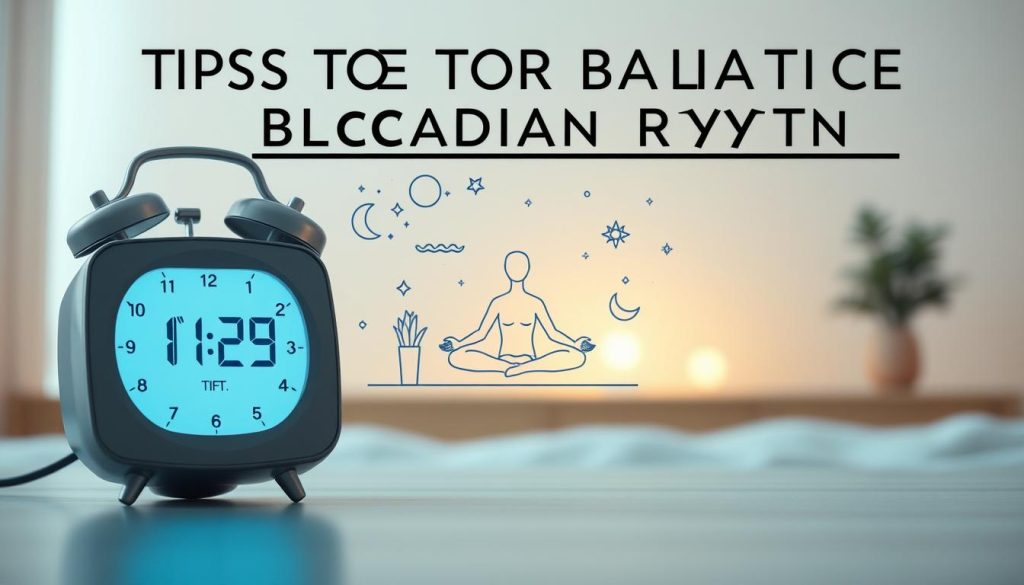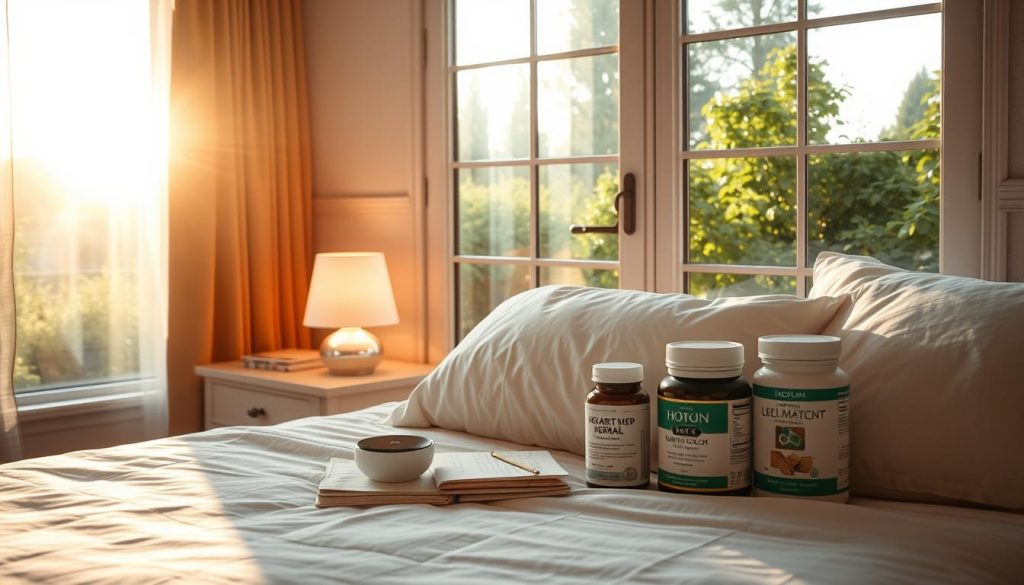In today’s fast world, it’s key to keep a good sleep-wake cycle. Learning to reset your circadian rhythm is important for better sleep and daily work. Our body’s internal clock affects many bodily functions, so it’s crucial to keep it in sync.
This article offers practical tips and insights to help you reset your body’s clock. Whether you’re facing jet lag, shift work, or just want better sleep, we’ve got you covered. Read on to find out how to get back to your natural rhythm and improve your sleep.
Understanding Circadian Rhythm
The human body has an internal body clock, or circadian rhythm. It controls our sleep-wake cycle and repeats every 24 hours. Light and darkness help our bodies work best during the day.
What is Circadian Rhythm?
Circadian rhythms are changes in our body that follow a 24-hour cycle. They are controlled by an internal clock in the brain. This clock helps our body’s systems work together smoothly.
Importance of a Healthy Sleep-Wake Cycle
A good sleep-wake cycle is key for health. Problems with the circadian rhythm can cause health issues. A well-set internal body clock helps with metabolism, hormone balance, and cell growth.
Keeping a regular sleep-wake cycle boosts mood, brain function, and health. Staying consistent with sleep and getting natural light helps keep our internal body clock in balance.
How to Reset Circadian Rhythm
Resetting your circadian rhythm is key to a healthy sleep cycle. It involves using natural methods to control sleep patterns. This means watching your light exposure, keeping a regular sleep schedule, and matching your exercise to your daily routine.
Natural Light Exposure
Getting natural light during the day is crucial for resetting your circadian rhythm. Begin your day by going outside or opening curtains to let sunlight in. This action helps lower melatonin levels, the sleep hormone, and keeps your body’s internal clock in sync.
Here’s how natural light exposure helps with a healthy sleep-wake cycle:
- Boosts alertness and mood
- Improves sleep quality at night
- Aligns your body with natural day-night cycles
Consistency in Sleep Schedule
Keeping a regular sleep schedule is a powerful way to control sleep patterns. Going to bed and waking up at the same time every day, even on weekends, helps your body get into a rhythm. This reinforces a stable circadian rhythm.
Benefits of a consistent sleep schedule include:
- Enhanced daytime functioning
- Reduced sleep latency (time taken to fall asleep)
- Improved overall sleep quality
Physical Activity and Timing
Doing regular physical activity at the right times can greatly help reset your circadian rhythm. Morning and early afternoon workouts are best as they increase alertness and energy. Avoid intense exercise before bed as it can make it harder to fall asleep.
Physical activity’s impact on a healthy sleep-wake cycle:
- Promotes deeper sleep cycles
- Reduces symptoms of insomnia
- Helps in maintaining a regular sleep pattern
Effective Circadian Rhythm Reset Techniques
Changing your circadian rhythm can greatly improve your sleep and health. Light therapy is a proven method. It involves exposing yourself to bright light in the morning. This helps your brain wake up and stay alert, setting your internal clock right.
Melatonin supplements are also helpful. Melatonin is a hormone that helps control sleep. Taking a small dose before bed can align your sleep cycle well.
Guided sleep meditations are another great option. They help reduce stress and make falling asleep easier. Adding these to your bedtime routine can help fix circadian rhythm issues.
- Light Therapy: Promote morning alertness.
- Melatonin Supplements: Assist in setting sleep timings.
- Guided Sleep Meditations: Enhance relaxation and sleep continuity.
Learning and using these techniques can greatly improve your sleep and daily life. Adding these strategies to your routine can help overcome sleep disorders and boost your well-being.
Tips for Balancing Circadian Rhythm
Effective strategies can help balance your circadian rhythm and improve your lifestyle. We’ll look at eating habits and technology use, key factors for a balanced internal clock.
Mindful Eating Habits
Eating at the same times each day helps keep your internal clock in sync. A diet full of fruits, veggies, and whole grains is good for health. It keeps your metabolism steady.
Avoid big meals before bed. They can mess up your sleep and rhythm.
Mindful Use of Technology
Technology, especially screens, can affect sleep because of blue light. Limit screen time an hour before bed. Blue light filters or ‘night mode’ settings can help.
These habits make for better sleep. They help your body stay in sync with its natural rhythm.

Natural Ways to Regulate Sleep Patterns
Creating a good sleep routine is key to healthy sleep. A calming pre-sleep routine is very effective. Activities like reading or a warm bath tell your body it’s time to sleep.
Also, make your sleep space the best it can be. Your bedroom should be quiet, dark, and cool. A comfy mattress and pillow are crucial for good sleep. Use blackout curtains and white noise machines to keep it peaceful.
Natural sleep aids are great and don’t have harsh side effects. Herbal teas like chamomile and valerian root, or essential oils like lavender, help you relax and sleep better. These natural remedies have been used for centuries.
Sticking to a sleep schedule is also important. Going to bed and waking up at the same time every day helps your body get into a rhythm. Avoid big meals, caffeine, and nicotine before bed to sleep better.
In short, focusing on sleep hygiene and using natural methods can make your sleep much better. Small changes to your routine and sleep space can greatly improve your sleep quality and health.
Hacks for Improving Circadian Rhythm
Improving your sleep quality is key to better health and happiness. Using hacks to adjust your circadian rhythm can make a big difference. Learning relaxation techniques and setting up a good sleep space are crucial steps.
Relaxation Techniques
Progressive muscle relaxation is a great way to relax before bed. Tense and then relax each muscle group, starting with your toes. Guided imagery, imagining calm scenes, also helps reduce stress and gets your mind ready for sleep.
Breathing exercises, like the 4-7-8 method, slow your heart rate. This helps your body get into a sleep-ready state.
Creating a Sleep-inducing Environment
A cozy bedroom is essential for good sleep. Keep the room cool, around 65°F, to help your body cool down naturally. Dim lighting in your room boosts melatonin, helping you sleep better.
Also, get rid of loud noises or use a white noise machine. This can make your sleep more peaceful.

- Maintain a consistent sleep schedule
- Limit caffeine and large meals before bedtime
- Incorporate daily physical activity
By using these simple strategies, you can sleep better and keep your circadian rhythm healthy. These changes can boost your energy, brain function, and overall health.
Managing Jet Lag Symptoms
International travel is getting more common. It’s key to manage jet lag to stay healthy and productive while traveling. Taking steps before and after flying can help your body adjust to new time zones.
Pre-flight Preparations
Getting ready for a trip abroad is a big task. But, adding a few smart habits can help fight jet lag before you fly. Start by adjusting your sleep schedule a few days early to match your destination’s time.
Drinking lots of water is also important. Airplane cabins are dry, which can make you feel tired and dehydrated. Drink water and avoid too much caffeine or alcohol. Getting your body ready will help a lot when you arrive.
Post-flight Adjustments
When you arrive, your body starts adjusting. To help with jet lag, get some sunlight right away. Sunlight helps your body clock adjust.
For a few days, do some light exercise and eat well to keep your energy up. Don’t take long naps during the day. Instead, go outside to get more sunlight and help your body adjust.
Using these tips before and after flying can make a big difference. With careful planning and adjustments, your trip can be more fun and less tiring.
Addressing Circadian Rhythm Disruptions
Dealing with circadian rhythm disruptions can be tough. This is especially true for those with shift work or seasonal changes. Taking the right steps can help manage these issues and improve sleep-wake cycles.

Impact of Shift Work
Shift work sleep disorder affects many who work odd hours, like night shifts. This irregular schedule messes with your body’s natural rhythm. Here are some ways to fight these effects:
- Strategic napping before night shifts can help reduce sleep debt.
- Bright light exposure during work hours to simulate daylight can help keep the body alert and align the circadian clock.
- Wearing sunglasses during the commute home to reduce light exposure and promote easier transition to sleep upon returning home.
Seasonal Changes
Seasonal changes, especially from summer to winter, can mess with our body’s rhythm. Here are some tips to handle these changes:
- Using light therapy lamps in the morning during winter months to compensate for reduced daylight and help maintain a regular sleep-wake cycle.
- Engaging in outdoor activities during daylight hours to maximize natural light exposure.
- Adopting a consistent sleep schedule throughout the year to stabilize the circadian rhythm despite seasonal changes.
| Disruption Cause | Management Strategy |
|---|---|
| Shift Work | Strategic napping, Bright light exposure, Sunglasses during commute |
| Seasonal Changes | Light therapy, Outdoor activities, Consistent sleep schedule |
Establishing a Healthy Sleep-Wake Cycle
Getting a good night’s sleep is key to feeling your best. It’s all about keeping a regular sleep schedule. Go to bed and wake up at the same time every day. This helps your body get into a rhythm, making it easier to sleep and wake up.
Light plays a big role in how we feel. Natural light in the day keeps us alert and happy. But, too much artificial light at night can mess with our sleep. So, make your bedroom cool, dark, and quiet for better sleep.
Exercise is also important for a good sleep cycle. Working out in the morning or afternoon is best. It keeps you healthy and helps you sleep better. By combining a regular sleep schedule, managing light, and staying active, you can improve your sleep and overall health.

